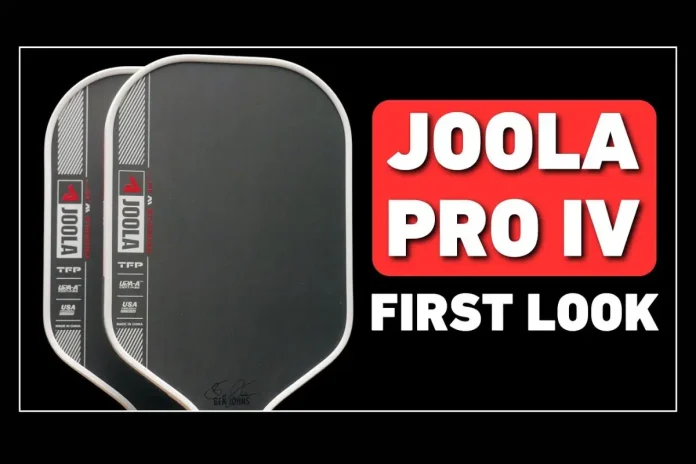JOOLA Pro 4 Perseus the Ultimate Pickleball Paddle: The JOOLA Pro 4 Perseus pickleball paddle has sparked widespread debate among players. Some are excited about its design and performance, while others are wary due to JOOLA’s past quality control issues. Is the JOOLA Pro 4 Perseus worth the $300 price tag? Let’s break down the pros, cons, and overall value of this new offering.
The JOOLA Perseus Series: A Quick Overview
While many players have referred to the JOOLA Pro 4 Perseus, it’s important to note that no such model exists. Instead, the paddle in question is part of the JOOLA Perseus series, which includes the Ben Johns Perseus CFS and the Ben Johns Perseus 3S. Each model offers core thicknesses of 14mm or 16mm, catering to different player preferences. The price for these paddles ranges from $199.95 to $279.95, depending on the specific model.
The Perseus line is part of JOOLA’s ongoing paddle innovation, which includes previous models like the Perseus 3 and MOD. Unfortunately, some of these prior releases faced issues with tournament legality, causing skepticism among players. The high price point of the Perseus 4 has further fueled doubts, especially when comparing it to other paddles with similar features at lower prices.
Is the JOOLA Perseus 4 Quality Overrated?
Community feedback on the JOOLA Perseus 4 has been mixed. While some players praise the minimalist aesthetic and design, others have concerns about the paddle’s durability and JOOLA’s history with quality control.
Many seasoned players remain skeptical about JOOLA’s commitment to consistent performance, with comments such as “Their quality issues aren’t going anywhere” echoing throughout online discussions. These past issues have made it difficult for the brand to win over some players, despite offering promising new features.
The USAPA Approval Concern
One major concern surrounding the JOOLA Perseus 4 is its USA Pickleball Association (USAPA) approval. After recent de-certifications of other JOOLA paddles due to incorrect model submissions, players are wary of investing in a paddle that might be deemed illegal for tournament play. According to USA Pickleball, “These paddles are no longer approved for use in USA Pickleball sanctioned tournaments.” Given this history, it’s crucial for players to verify a paddle’s USAPA certification before purchasing.
Design and Performance: What Players Are Saying
The JOOLA Perseus 4’s design has garnered both praise and criticism. Some players appreciate the understated, quiet look of the paddle, favoring its minimalist appeal. “I like how quiet it looks. There’s not a lot going on the face of the paddle,” commented one player. However, others feel the design lacks originality, with one Reddit user stating, “They now make paddles that look like every paddle on the market.”
The Perseus 4’s performance features are where the debate intensifies. The paddle’s larger sweet spot and Charged Carbon Surface Technology are designed to enhance power, spin, and accuracy. These innovations are meant to appeal to serious players looking for top-tier performance, especially in terms of off-center hits. Despite this, many players question whether these advancements justify the hefty price tag.
CFS vs. 3S: Understanding the Differences
The JOOLA Perseus line includes two main variations: the Ben Johns Perseus CFS and the Ben Johns Perseus 3S. Both come in 14mm and 16mm core thickness options, but subtle differences in the materials or features likely affect performance.
While the price difference hints at variations in core material, players may need to experiment with both models to determine which best suits their playing style.
Price Point: Is It Worth the Investment?
The Perseus 4’s $300 price tag raises important questions about its value. Many players feel the paddle’s price is simply too high, given JOOLA’s ongoing quality concerns. “This is not what I saw from JOOLA for the Pro IV release,” remarked one player, implying that the new model doesn’t live up to expectations. The issue isn’t just the price but also the perceived value—if a paddle lacks consistent performance and durability, the premium price becomes hard to justify.
JOOLA Perseus vs. Hyperion: A Head-to-Head Comparison
When compared to other paddles on the market, the JOOLA Perseus 4 and the JOOLA Hyperion stand out. The main difference between the two lies in the paddle face shape.
The Perseus has a flat face, prioritizing power and spin, while the Hyperion has a curved top, offering more speed. The choice between these two paddles ultimately comes down to whether players prioritize power or speed.
Alternatives to Consider
Given JOOLA’s quality concerns and the high price of the Perseus 4, many players are considering alternatives. Other paddle brands offer similar features at lower price points, and some players recommend avoiding JOOLA altogether due to the company’s track record with paddle legality. If you plan on competing in tournaments, ensuring that your paddle is USAPA-approved is essential.
News in Brief: JOOLA Pro 4 Perseus the Ultimate Pickleball Paddle
The JOOLA Pro 4 Perseus pickleball paddle has generated mixed reactions from players. Some praise its design and performance, while others remain skeptical due to JOOLA’s past quality control issues. With a price tag of $300 and questions about USAPA approval, players are urged to carefully research before buying.
ALSO READ: Life Time and JOOLA Team Up for Exclusive Pickleball Open Play at Annapolis

